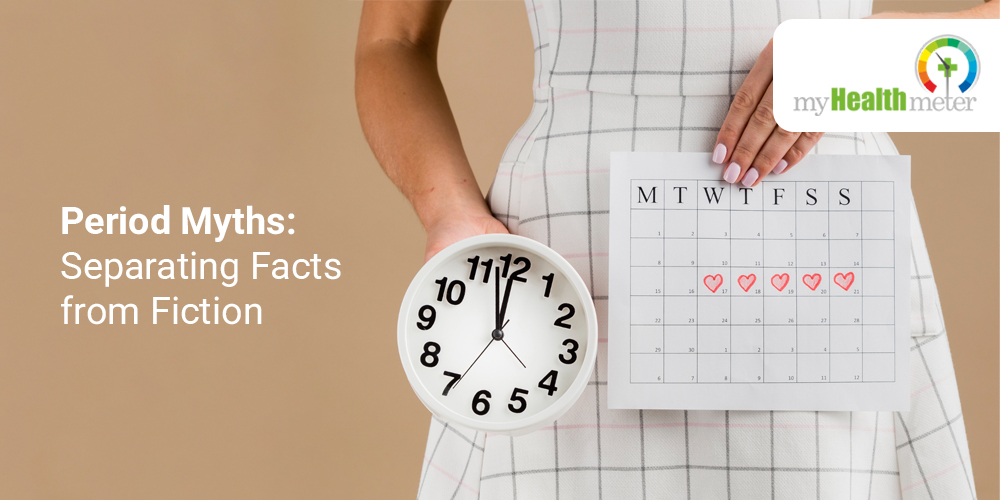Period Myths: Separating Facts from Fiction
-
August 25, 2025
-
225 Views
Period Myths: Separating Facts from Fiction
Menstruation is a fundamental aspect of women’s health, yet myths and misconceptions about periods abound in India, often fuelling stigma, shame, and barriers to proper care. These misconceptions can have real health consequences, especially when coupled with limited access to menstrual hygiene products and reliable information. Let’s break this silence—by calling out the most common myths and revealing the facts, we move one step closer to dignity, health, and equality for all women.
Despite progress through national programs like the Menstrual Hygiene Scheme, serious challenges remain. According to the National Family Health Survey-5, only 27.7% of young Indian women aged 15–24 have access to adequate menstrual health and hygiene (MHH)—a set that includes safe menstrual products, clean water, soap, and private sanitary facilities. In contrast, period poverty—lack of access to these essentials—affects nearly three-fourths of young women, especially in rural and marginalized communities. Beyond hygiene, misinformation and cultural taboos evoke deep-rooted anxieties, prevent open discussion, and sometimes endanger women’s health and self-esteem.
Health concerns related to periods are prevalent: about 83% of Indian women experience menstrual pain, and 41% do not use any pain relief. Myths persist despite decades of medical progress, and even today, stigma silences nearly 6% of women online, while fears of judgment keep many from seeking help. The question is not just about access, but about knowledge—and it’s time to challenge the myths head-on.
Myth vs. Fact: Debunking Common Period Misconceptions
Myth 1: Women “Shed Impure Blood” During Periods
Fact: Menstrual blood is not impure—it is the same blood that circulates in the body, along with uterine tissue that is shed each month when pregnancy doesn’t occur. Period blood can vary in consistency and colour—from bright red to dark brown—based on the body’s normal oxidation processes. Shaming women for “dirty” blood adds unnecessary emotional distress and is scientifically unfounded.
Myth 2: Missing a Period Means Pregnancy
Fact: While pregnancy is one reason for a missed period, it is far from the only cause. Hormonal imbalances, stress, poor nutrition, rapid weight changes, polycystic ovary syndrome (PCOS), and illness can all disrupt cycles. Medical testing is the only way to confirm pregnancy conclusively.
Myth 3: You Can’t Exercise During Your Period
Fact: Moderate exercise—like walking or yoga—is safe during periods and can actually reduce menstrual cramps and improve mood. High-intensity workouts might be uncomfortable for some, so listen to your body, but don’t avoid movement out of fear.
Myth 4: It’s Impossible to Get Pregnant During Your Period
Fact: Though rare, it is possible to conceive if intercourse occurs during or soon after menstruation, especially with a shorter cycle. Sperm can survive for several days; if ovulation occurs soon after bleeding, pregnancy can result.
Myth 5: You Shouldn’t Wash Your Hair During Periods
Fact: There’s no medical reason to avoid bathing or washing your hair. In fact, good hygiene—including warm baths—can ease cramps and discomfort. Personal cleanliness has a positive effect on both physical and mental well-being.
Myth 6: Using Tampons Makes You Lose Your Virginity
Fact: Virginity is a social construct not defined by the hymen or tampon use. Tampons may stretch the hymen, but they do not impact virginity in the cultural or medical sense. Hymens can also break or stretch naturally, entirely unrelated to sexual activity.
Myth 7: PMS Is Just “In Your Head”
Fact: Premenstrual syndrome (PMS) is real and affects up to 90% of menstruating women. Mood swings, bloating, headaches, and fatigue have biological causes related to hormonal fluctuations. Recognizing PMS as valid allows women to seek support and treatment without stigma.
Dos and Don’ts for a Healthier Period
Dos:
- Use clean, safe menstrual products (pads, tampons, cups) and change them regularly.
- Maintain hygiene: Bathe regularly and keep genital area clean.
- Track your cycle to understand what’s normal for your body and recognize irregularities.
- Seek medical attention for severe pain, heavy bleeding, or signs of infection.
- Share and talk openly: Encourage positive conversation around periods to fight stigma.
Don’ts:
- Don’t believe myths about impurity, hygiene, or limitations during periods.
- Don’t ignore persistent pain or changes—consult a doctor if symptoms are unusual.
- Don’t limit physical activity unless advised due to specific health reasons.
- Don’t use unclean materials as substitutes for proper menstrual products.
- Don’t let stigma silence you—ask questions, seek answers, and support others.
Periods are a natural and essential part of human biology, yet the weight of myths and misinformation continues to burden the physical and mental health of many. Clearing away unscientific taboos is not just about education, but about affirming dignity, autonomy, and choice for every menstruator. When individuals and communities dispel outdated beliefs—such as notions of impurity, unnecessary restrictions on hygiene or activity, or the idea that periods define a woman’s worth—they open doors to improved well-being, confidence, and acceptance.
Moving beyond myths ensures that no one feels isolated or ashamed for experiencing a biological cycle that upholds life itself. This shift requires honest conversations, the normalization of seeking medical advice, and an inclusive culture that supports people at every stage of their menstrual health journey. Access to accurate information, empathy, and proper healthcare should be universal, helping to prevent infections, minimize health risks, and protect self-esteem.
Ultimately, the process of debunking period myths benefits everyone, not just those who menstruate. It contributes to gender equality, stronger families, and healthier communities—where people can manage their periods with confidence and without fear. Let us keep questioning unfounded notions, offering evidence-based answers, and building a society where talking about periods is as ordinary as discussing any aspect of our health.





